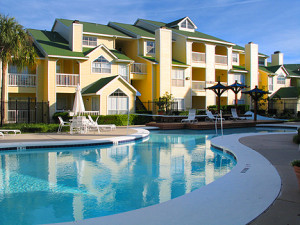FHA versus ADA: Quick Reference Guide
ACCESSIBILITY Quick Reference: When a property has areas that must comply with both FHA and ADA
I. Synopsis:
- Animals
FHA – “Assistance animal
Perform task OR provide support.
Can be ANY type of animal.
Allowed in a dwelling.
VERSUS
Perform task ONLY.
Must be DOG (mini horse exception).
Allowed in public accommodations.
-
Areas Covered
FHA – Multi-family housing
Structures of 4+ units for dwelling
Versus
ADA – Public accommodations
Business office/ leasing office
-
Safe Harbor
FHA – choose among HUD
Alternatives – followed some standard.
Versus
ADA – NO SAFE HARBOR.
Constantly evaluate to ADAAG/ ADA
-
Liability
FHA – Some limitations,
None for injunctive relief.
Versus
ADA – NO limitations
Fines increase for successive filings.
-
Due Diligence
FHA – Accessibility Survey promoted
Versus
ADA – Accessibility Survey promoted
II. Properties Covered Under Both:
Areas within FHA multifamily residential facilities that qualify as places of public accommodation are covered by Title III of the ADA if use of the areas is not limited exclusively to owners, residents, and their guests. Some examples are as follows:

-
A private residential apartment complex (FHA) contains a rental office. The rental office is a place of public accommodation (ADA) because the general public comes to this office seeking a service (leasing of an apartment).
-
A residential condominium association (FHA) maintains a longstanding policy of restricting use of its party room to owners, residents, and their guests. Consistent with that policy, it refuses to rent the room to local businesses and community organizations as a meeting place for educational seminars. The party room is not a place of public accommodation (ADA) because the general public does not receive a service (seminar) at this location.
-

Swimming Pool A private residential apartment complex (FHA) includes a swimming pool for use by apartment tenants and their guests. The complex also sells pool “memberships” generally to the public. The pool qualifies as a place of public accommodation (ADA) because the general public purchases a “good” in the form of a membership.
-
A private, nonsectarian, nonprofit organization operates a homeless shelter permitting stays ranging from overnight to those of sufficient length to result in coverage as a dwelling under the FHA. Because it permits short-term, overnight stays, the shelter may also be considered a place of public accommodation as a “place of lodging,” and covered by Title III of the ADA. In addition, if the shelter provides a significant enough level of social services, such as medical care, meals, counseling, transportation, or training, it may also be covered under Title III as a “social service center establishment. “
-
A model home is generally not a place of public accommodation as it does not fall under one of the 12 categories of places of public accommodation. If, however, the sales office for a residential housing development (FHA) were located in a model home, the area used for the sales office would be considered a place of public accommodation (ADA). Although model homes are not covered, the Department of Justice encourages developers to voluntarily provide at least a minimal level of access to model homes for potential homebuyers with disabilities. For example, a developer could provide physical access (via ramp or lift) to the primary level of one of several model homes and make photographs of other levels within the home as well as of other models available to the customer.
-
A vacation timeshare property can be a place of public accommodation. It depends upon how much the timeshare operation resembles that of a hotel or other typical place of lodging. Among the factors to be considered in this determination are —
1) Whether the timeshare offers short-term ownership interests (for instance, stays of one week or less are considered short term);
2) The nature of the ownership interest conveyed (e.g. , fee simple);
3) The degree of restrictions placed on the ownership (e.g. , whether the timeshare owner has the right to occupy, alter, or exercise control over a particular unit over a period of time);
4) The extent to which the operations resemble those of a hotel, motel, or inn (e.g. , reservations, central registration, meals, laundry service).
Please contact our office Toll Free: 855-932-3784 x 5 should you wish to work with a consultant on your property’s compliance for both FHA and ADA standards .
